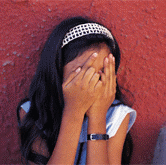 So Mohammed Yunis is in Bahrain. He is talking to government officials about establishing a Grameen-like microfinance institution in Bahrain.
So Mohammed Yunis is in Bahrain. He is talking to government officials about establishing a Grameen-like microfinance institution in Bahrain.I think the idea itself is great. In Bahrain, around 30,000 people receive "non-productive" social assistance from the Ministry of Social Affairs. Grameen Foundation supports microfinance programs that enable the poor, mostly women, to lift themselves out of poverty and make better lives for their families. To do this, they partner with a worldwide network of microfinance institutions and offer support in the form of in the form of funding, technical assistance, training and technology-transfer. Then basically those microfinance institutions would make small loans, usually less than $200, to individuals, usually women, to establish or expand a small, self-sustaining business.
In our closest neighbor, Saudi Arabia, the concept was introduced successfully through a partnership between Grameen and PFP (Productive Families Project), a private non-profit venture established by Saudi businessman Abdul Latif Jameel. The business plan for Abdul Latif Jameel's PFP was actually developed by Grameen. The loan range was set to BD 100-500. Since its inception in 2004, the program now reached more than 7,000 women and enjoys 100% repayment. The Grameen model was slightly tweeked of course to incorporate Islamic principles (e.g. calling the interest rate "fee").
Not bad, Mr. Jameel. I won't even comment on our Bahraini business community, which is in total "la la land" when it comes to serving the community. Anyway this project has potential and can even be profitable. Microfinance banks have a return on equity range of 25-50% worldwide (interest rates on microloans are usually high between 15-35% according to Grameen). I am worried, though, about government involvement and management of this, given its historical record of turning good projects into disasters. News report indicate there is still no agreement on proper loan-size, capitalization, source of finance, interest rate, or products and services offered. I guess only then will it be clear whether or not this is a viable establishment in Bahrain. I hope this happes soon..!

8 comments:
I thought this article might interest you:
A Nobel loan shark?
http://www.zmag.org/sustainers/content/2006-10/19bond.cfm
thats alot of families! so each family would have an average of 4 people!! do the math thats alot
did you read 1 million yet?
is it this desperate over there? whats the non-productive social assistance exactly?
Hi error thanks so much for your good observation. I changed it to "people" just to be percise. But essentially the idea is the Ministry of Social Affairs publishes this number for the "individuals" receiving unemployment social assistance, and each individual probably has or will have a family.. so yes that would raise the number significantly to at least 100,000. The Bahrain Center for Human Rights adds 80,000 additional people who are ineligible for Ministry aid but still receive charity assistance. Then we have the Ministry of Housing's figure of 44,000 on the waiting list for government low-income family housing. The official statistics also show that there are 6,000 ruined houses and that there is a project for rebuilding or maintaining 45,000 houses but in a period of 8 years. A survey by Bahrain Monetary Agency (Central Bank now) found that while the poverty rate is increasing, there are 5,200 wealthy people in Bahrain. There are fears that the middle class is eroding rapidly and the gap in wealth will keep increasing. So I'd say yes the situation is pretty bad.
There is a documentary about poverty in Bahrain that was banned by the government but is online now:
http://www.bahrainrights.org/node/112
As for non-productive, that's just my way of saying those people receive grants in cash that they just use to cover daily expenses which doesn't really get them out of poverty in any self-sustaining way. The total population according to the CBB is 707,000 (I don't see any figure for the number of Bahrainis, but it's probably around half a million or so).
Bint battuta this is definitely an interesting article! I also read a lot of criticism that microfinance, while it lifts people just above the povery line, does very little from that point on. In a way, yes Grameen is profiting and it charging very, very high interests, but then the writer of the article struck me as very ideological in condemning Grameen. Yes the women may be exploited, like sweatshop workers are, but what's their alternative? For all its worth, they are getting money from Grameen that no other institution is giving them. Whether we like it or not, this was their best alternative and I'm sure they would rather get loans with high interests than no loans at all..
مشروع حلو و مفيد بس انشالله ينجح و الناس صج تستفيد منه مو يطلع حجي بس .... بس مثل ما قلتي في احتمال ان المشروع يفشل دام ان وزارة الشؤون راح تديره .... و حسب اللي مكتوب فالجرايد ان ميزانية البنك مليون دينار بس ..... هالمليون شراح تسوي و جم عائلة راح تستفيد من هالمشروع و جم القرض راح يكون .... و القروض اللي راح يعطيها البنك راح تمول اي نوع من المشاريع ؟ لتقولون لي صناعات و حرف يدوية او حتى مساعدة ربات البيوت في مشاريع الطباخ المنزلي لانها بصراحة ما راح توكل عيش خصوصا ان السوق البحريني صغير وراح يتشبع من هالنوع من الانشطة ..... و يعطيج العافية على هالبوست
Mashkoor anonymous 3ala moroorek oo 3asaah khair hal marra!
The idea is nice on paper but may not be viable for the Bahrain contextand I doubt a lot that the ministry of social affars will be intelligent enough to amend the concept in a good way to fit our situation here but I agree that we should wait and see.
يسلموووووووووووووو اخت ماغى كلامك كلو حصل السنه دى بعد انقلابات الشعوب وانا خاصه فى برجى العذراء اكتشفت نفس المشاعر
Post a Comment